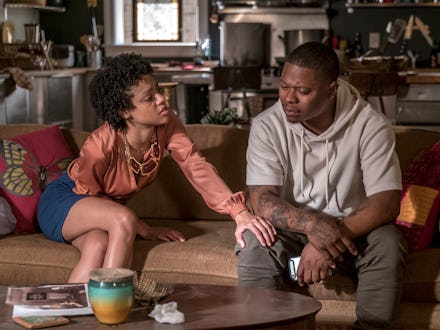How Lena Waithe’s ‘The Chi’ perfectly illustrates the contagious nature of violence

The Chi, the new Showtime drama created by Master of None’s Lena Waithe, begins with a fatal shooting. The promising first episode, which premiered Sunday night, opens on Coogie (played by 14-year-old Jahking Guillory), a quick-witted teen with long, flowing curls — like a girl’s hair, another character says derisively later in the pilot — and a thing for brightly colored socks.
Coogie has a big soft spot, as is quickly established: He buys jerky at a bodega and feeds it to a hungry backyard dog in what seems to be a regular ritual. It’s that small act of kindness that puts him at the scene of another boy’s death. Coogie stumbles across the body of the dead teen, who’s clearly just been shot, his body dumped on a corner.
Impulsively, Coogie grabs the other boy’s sneakers and chain and stuffs the loot in his backpack, setting off a deadly sequence of events that will lead to another shooting death by the end of The Chi’s first episode.
And it’s that sequence, linking the sprawling series’ four main characters, that so powerfully illustrates the rippling effect of gun violence — the way it radiates out from a single victim, compounding in devastation like an avalanche gathering snow.
A 2017 study published in the Journal of the American Medical Association posited that more than half of “gunshot violence episodes” that occurred in Chicago between 2006 and 2014 were due to “social contagion.” According to the researchers, gun violence spreads like an epidemic, like a disease, using the pathways of “interpersonal ties.”
Sociologist and study author Andrew Papachristos explained it to NPR’s All Things Considered in 2017 as such: “So if I get shot, for instance, there’s a high likelihood that the people around me in my networks will also be victims and that, then, their friends will be victims. And their friends’ friends will be victims ... Not only is it an epidemic, we can actually show in our study how it’s transmitted and actually specific individuals who may be at risk.”
Papachristos is hardly the first to suggest gun violence is a contagious public health crisis. Gary Slutkin, founder of the organization Cure Violence, which works to stop the spread of violence in communities across the country, told NPR that seeing gun violence as an infectious disease takes the judgement aspect away.
“This takes us out of morality,” Slutkin said. “This takes us out of ‘these are good people and bad people’ into there’s something going on. It is contagious and ... when it’s managed as a health issue, you can rapidly drop it and sustain drops for long periods of time.”
It’s to this view that Waithe’s The Chi seems to subscribe — the first episode is far less interested in judging the perpetrators of violence as it is in mapping the way violence reverberates throughout a community. It devastates those closest to the victim, of course, leaving grieving parents and derailing a sibling’s personal successes.
But the violence touches everyone in The Chi’s intricate web of characters, not just the victims’ inner circles. It frightens a boy who witnesses a shooting. It ripples out to a young father, an owner of a local bodega and an improbably kind Chicago cop.
The most effective turn of the series premiere, though, is the point it makes about the victims themselves. The show’s gun violence cuts off its victims’ plotlines before we even get a chance to see them, showing that the greatest loss is the characters whose stories never get the chance to be told.